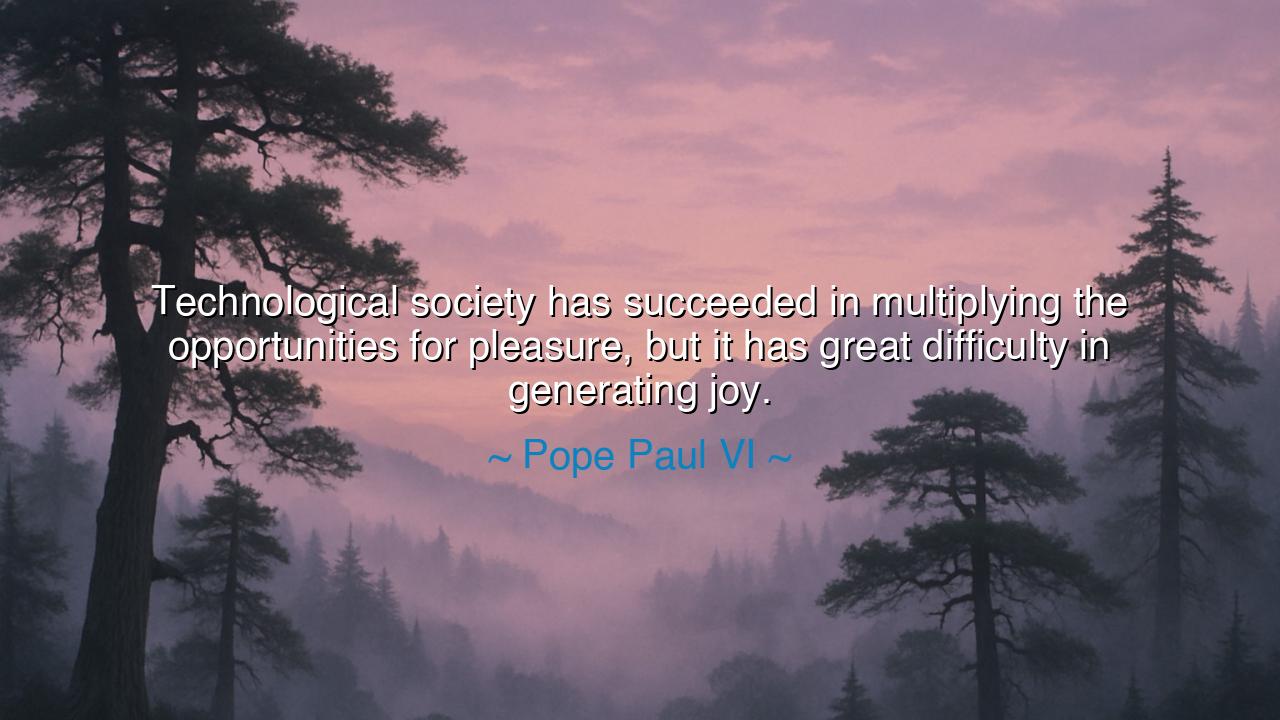
Technological society has succeeded in multiplying the
Technological society has succeeded in multiplying the opportunities for pleasure, but it has great difficulty in generating joy.






"Technological society has succeeded in multiplying the opportunities for pleasure, but it has great difficulty in generating joy." These words from Pope Paul VI strike at the very heart of our modern existence. In his reflection, he identifies a paradox that has only grown more relevant with the passing of time: technology, in all its wonder and innovation, has granted humanity countless opportunities for pleasure—from instant access to entertainment, to the ease of luxuries and conveniences. Yet, despite this abundance of pleasure, something is amiss. Joy, that deeper, more fulfilling experience of the spirit, remains elusive, leaving many to ask, "Is there more to life than fleeting gratification?" Pope Paul VI’s words invite us to ponder the difference between pleasure, which is often superficial and momentary, and joy, which is profound and enduring.
In the ancient world, this very tension was understood by philosophers such as Aristotle. He distinguished between pleasure and happiness, recognizing that while pleasure might be found in satisfying the body’s desires, true happiness—which he referred to as eudaimonia, or flourishing—was something deeper. For Aristotle, joy was not found in the transient satisfaction of the senses but in the cultivation of virtue, the pursuit of wisdom, and the alignment of one’s life with higher purpose. He warned that those who sought only pleasure would find themselves trapped in a cycle of emptiness, forever chasing the next fleeting source of gratification without ever reaching the deeper contentment that comes from living a life of meaning and moral integrity. His teachings remind us that pleasure is but a shadow of the joy that comes from living in harmony with our truest selves.
Similarly, the Stoics of ancient Rome, like Seneca and Epictetus, understood that the pursuit of external pleasures was fraught with danger. They taught that true joy—or tranquility, as they called it—came from cultivating inner peace and self-discipline, not from indulging in sensory experiences. Pleasure, in their view, was fleeting and often led to addiction, while joy was a lasting state of contentment that arose from mastering one’s desires and living in accordance with nature and reason. For the Stoics, joy was self-sufficient and independent of external circumstances, unlike pleasure, which required constant stimulation from the outside world.
This ancient wisdom holds a mirror to our modern lives. Technology, with its rapid advancements and the advent of the digital age, has indeed multiplied opportunities for pleasure. The internet, social media, video games, and virtual realities offer endless sources of entertainment, excitement, and instant satisfaction. Yet, as Pope Paul VI notes, these pleasures often fail to generate the deeper joy that nourishes the soul. In fact, the pleasures provided by modern technology can often distract us from the things that truly bring fulfillment: relationships, meaningful work, purpose, and spiritual growth. People are more connected than ever, yet many find themselves more isolated and disconnected from a sense of true happiness.
Take the example of smartphones, which have become ubiquitous in modern life. These devices offer an endless array of entertainment, instant communication, and social connection, yet many report feeling a sense of emptiness or discontent after hours spent scrolling through social media or playing mobile games. Research has shown that while smartphones provide pleasure in the form of constant connectivity, they can also contribute to feelings of anxiety, depression, and isolation. The short-term pleasure of a notification or a like is quickly replaced by a craving for more, leaving individuals in a perpetual state of chasing after the next momentary fix, rather than finding lasting joy in the deeper aspects of life.
The lesson from Pope Paul VI’s words is one of reflection and introspection. In our pursuit of pleasure, we must not lose sight of joy. True joy, the kind that sustains us in times of difficulty and fills our lives with meaning, does not come from the quick gratification of the senses but from the deeper sources of human connection, purpose, and virtue. Technology, in its current form, can be a tool for momentary pleasure, but it must not become an obstacle to finding the lasting joy that comes from a life well-lived. We must learn to use technology wisely, not allowing it to dominate our attention or distort our priorities.
In our own lives, we must ask: Are we chasing pleasures that only distract us, or are we nurturing the joy that comes from meaningful work, connection, and self-improvement? The path to true fulfillment lies not in the accumulation of pleasure, but in the cultivation of a life of purpose. Whether through meditation, spending time with loved ones, or pursuing passions that align with our deepest values, we must strive to find joy in the things that endure, rather than the fleeting moments that technology so easily offers. Let us reclaim our attention from the endless cycle of instant gratification and turn toward the lasting joy that comes from living a life in harmony with the values and relationships that matter most.






AAdministratorAdministrator
Welcome, honored guests. Please leave a comment, we will respond soon